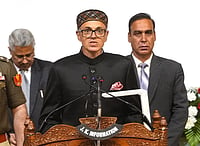On Friday, the United States announced its intention to implement fresh visa restrictions on numerous Hong Kong officials in response to the escalating suppression of rights and freedoms in the territory under Chinese rule.
US Announces New Visa Restrictions On Hong Kong Officials Amid Escalating Suppression Of Rights And Freedoms
The United States has announced new visa restrictions on Hong Kong officials in response to escalating suppression of rights and freedoms, citing concerns over China's encroachment on the territory's autonomy. This move underscores growing international tensions amid the implementation of a controversial national security law in Hong Kong.

According to a statement issued by U.S. Secretary of State Antony Blinken, over the past year, China has persistently undermined Hong Kong's guaranteed high level of autonomy, democratic structures, and fundamental liberties, exemplified by the recent introduction of a new national security law referred to as Article 23.
"In response, the Department of State is announcing that it is taking steps to impose new visa restrictions on multiple Hong Kong officials responsible for the intensifying crackdown on rights and freedoms," Blinken said. However, the statement did not specify which officials would be affected.
In November, Hong Kong criticized a U.S. bill advocating for sanctions against 49 Hong Kong officials, judges, and prosecutors involved in national security cases, asserting that U.S. legislators were engaging in political theatrics and attempting to intimidate the city.
The Hong Kong Sanctions Act listed officials such as Secretary for Justice Paul Lam, Police Chief Raymond Siu, and judges Andrew Cheung, Andrew Chan, Johnny Chan, Alex Lee, Esther Toh, and Amanda Woodcock.
Previously, the United States has imposed visa restrictions and other sanctions on Hong Kong officials accused of undermining freedoms. Additionally, it declared an end to the special economic privileges that the territory had long benefited from under U.S. law.
It also cautioned that foreign financial institutions engaging with these individuals would face sanctions.
Under the U.S. Hong Kong Policy Act, the State Department is obligated to annually report to Congress on the situation in Hong Kong.
"This year, I have again certified that Hong Kong does not warrant treatment under U.S. laws in the same manner as the laws were applied to Hong Kong before July 1, 1997," Blinken stated, alluding to the date when Hong Kong was returned to China by Britain.
"This year’s report catalogs the intensifying repression and ongoing crackdown by PRC and Hong Kong authorities on civil society, media, and dissenting voices, including through the issuance of bounties and arrest warrants for more than a dozen pro-democracy activists living outside Hong Kong," Blinken stated, referring to the People's Republic of China.
Earlier on Friday, Radio Free Asia, funded by the U.S., announced the closure of its Hong Kong bureau due to concerns about staff safety following the implementation of the new national security law.
Hong Kong returned to Chinese sovereignty with the assurance that its high level of autonomy and freedoms would be safeguarded under the "one country, two systems" framework.
In recent years, numerous pro-democracy politicians and activists have been imprisoned or forced into exile, while liberal media outlets and civil society organizations have been shuttered.
This month, 145 community and advocacy groups issued a joint statement condemning the security law and urging sanctions on officials involved in its enactment, along with a review of the status of Hong Kong's Economic & Trade Offices worldwide.

























